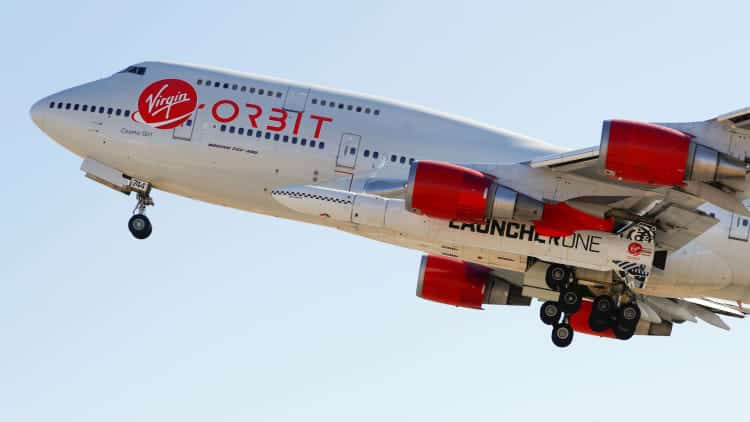
Bankrupt rocket company Virgin Orbit received a $17 million “stalking horse” bid for its modified 747 carrier jet and other aircraft assets, as it continues to examine options during Chapter 11 court proceedings.
Virgin Orbit agreed to the terms of the potential aircraft deal from aerospace venture Stratolaunch, which is developing the world’s largest airplane called “Roc” as an airborne platform for hypersonic flight testing. A stalking horse bid represents the first foray on assets of a bankrupt company, and effectively sets the minimum bid for any potential competing offers.
According to bankruptcy filings released Tuesday, the stalking horse agreement followed “hard-fought negotiations” between the companies. The deal would see Stratolaunch buy Virgin Orbit’s aircraft assets for cash, with a $1.7 million deposit to be made by the buyer immediately in escrow if the deal goes through.
Virgin Orbit filed for bankruptcy protection on April 4 after the company failed to secure a funding lifeline and laid off nearly its entire workforce.
“Stratolaunch continually evaluates how to increase our capacity to meet the customer demand while ensuring our country has the capability to accelerate hypersonic technology via leap-ahead flight demonstrations,” the company said in a statement.
Stratolaunch is owned by Cerberus Capital Management – which bought the company from the late Microsoft co-founder Paul Allen’s Vulcan in 2019.
Cerberus previously looked to take Richard Branson’s distressed rocket company private, and was among the closest of several potential bidders to striking a deal, but ultimately balked, according to a person familiar with the late stages of Virgin Orbit’s attempts to avoid bankruptcy.
Representatives for Cerberus did not respond to CNBC requests for comment on the take-private discussions. A Virgin Orbit spokesperson declined to comment on the potential Cerberus deal, but said in a statement that the company is “pleased that the numbers and quality of the indications of interest reflect the innovative ideas and hard work the team has put into the development of this unique system.”
Epstein, who had been a customer of JPMorgan from 1998 through 2013, became a customer of Deutsche Bank after JPMorgan ended its banking relationship with him.
“Deutsche Bank picked up exactly where JPMorgan left off and became the bank that Epstein needed to fund his sexual abuse and sex-trafficking operation,” the suit says.
Epstein killed himself in a Manhattan federal jail in August 2019, a month after being arrested on federal child sex trafficking charges.
His arrest in that case came 10 years after he served a jail sentence or more than a year for pleading guilty in Florida state court to soliciting sex for money from an underage girl. That 2008 guilty plea was widely publicized.